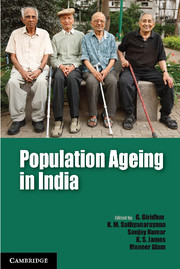Book contents
- Frontmatter
- Contents
- List of Figures
- List of Tables
- Preface
- Acknowledgements
- Introduction
- 1 Demographics of Population Ageing in India
- 2 Elderly Workforce Participation, Wage Differentials and Contribution to Household Income
- 3 Living Arrangements of Elderly in India: Policy and Programmatic Implications
- 4 Health Status of Elderly in India: Trends and Differentials
- 5 The National Policy for Older Persons: Critical Issues in Implementation
- 6 Policy Initiatives on Population Ageing in Select Asian Countries and Their Relevance to the Indian Context
- 7 Studies on Ageing in India: A Review
- Contributors
- Index
2 - Elderly Workforce Participation, Wage Differentials and Contribution to Household Income
Published online by Cambridge University Press: 05 August 2014
- Frontmatter
- Contents
- List of Figures
- List of Tables
- Preface
- Acknowledgements
- Introduction
- 1 Demographics of Population Ageing in India
- 2 Elderly Workforce Participation, Wage Differentials and Contribution to Household Income
- 3 Living Arrangements of Elderly in India: Policy and Programmatic Implications
- 4 Health Status of Elderly in India: Trends and Differentials
- 5 The National Policy for Older Persons: Critical Issues in Implementation
- 6 Policy Initiatives on Population Ageing in Select Asian Countries and Their Relevance to the Indian Context
- 7 Studies on Ageing in India: A Review
- Contributors
- Index
Summary
Introduction
The Report to People on Employment (Government of India, 2010) recognizes the shift in India's age structure due to increasing longevity and declining fertility and the resultant doubling of the share of older persons in the population between 2001 and 2026. However, the report stops short of providing a clear strategy to enhance the income security of the elderly and create more favourable working conditions. In addition, the report does not highlight the problem of accessing social security, particularly in the informal sector. Considering the fact that providing employment and social security is crucial for the poor and other vulnerable sections of the population including the elderly workforce, there is a need for strong policy initiatives to overcome this lacuna. Much of the elderly workforce in informal sectors is left to fend for itself. Moreover, low wages and increasing wage differentials across different segments of the labour market have led to the concentration of benefits of recent economic growth in the hands of more secured job holders. One recent study (Bloom et al., 2010) finds low levels of earning during prime working age and consequently low levels of saving as one of the important reasons for participation of the elderly in the labour market in India. This is happening at a stage in the life of the elderly when the demand for health and medical care is likely to go up, and in turn increasing the old age dependency and therefore the economic burden of the ageing generation.
- Type
- Chapter
- Information
- Population Ageing in India , pp. 42 - 73Publisher: Cambridge University PressPrint publication year: 2014
- 7
- Cited by



